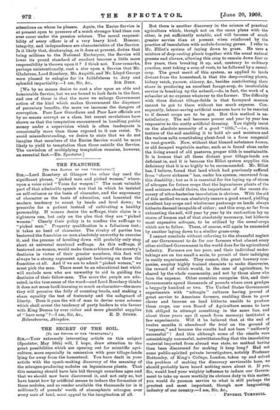TAP, SECRET OF THE SOIL.
[To THE EDITOR OP THE .SPEOPATOR.* J Srn,—Your extremely interesting article on this subject (Spectator, May 16th) will, I hope, draw attention to the great possibilities which are opening out for scientific api- culture, more especially in connexion with poor tillage-lands lying far away from the homestead. Yoa have dealt in your article with the epoch-making discovery of the meaning of the nitrogen-producing nodules on leguminous plants. That this meaning should have lain bid through countless ages and that we should now have discovered it, and not only so, but have learnt how by artificial means to induce the formation of these nodules, and so render available the thousands (or is it millions?) of pounds' worth of atmospheric nitrogen over every acan of land, must appeal to the imagination of, all. But there is another discovery in the science of practical agriculture which, though not on the same *plane with- the other, is yet sufficiently notable, and will become of much greater service than at present when reinforced by: the practice of inoculation with nodule-forming germs. I refer to Mr. Elliot's system of laying down to grass. He use a mixture of deep-rooting plants together with the usual natural grasses and clovers,•allowing this crop to remain down feur or five years, then breaking it up, and, contrary to ordinary practice, next taking a crop of roots, to be followed by a' cereal- crop. The great merit of this system, as applied to lands distant from the homestead, is that the deep-rooting plants, kidney vetch, yarrow, chicory, &c., besides contributing their share in producing an excellent forage-crop, do incalculable service in breaking up the subsoil,—do, in fact, the work of a subsoiler at no expense whatever to the farmer. The difficulty with these distant tillage-fields is that farmyard manure cannot be got to them without too much expense. Con- sequently, labour-saving artificial manures have to be resorted to if decent crops are to be got. But this method is un- satisfactory. The soil becomes poorer and year by year less responsive to the costly artificial dressing. You rightly insist on the absolute necessity of a good " tilth,"—i.e., a certain texture of the soil enabling it to hold air and moisture and the various salts constituting plant-food in a form congenial to root-growth. Now, without that blessed substance humus, or old decayed vegetable matter, such as is found close under the living award of old pastures, proper tilth is unattainable. It is humus that all these distant poor tillage-lands are deficient in, and it is because the Elliot system supplies this deficiency that it is so highly to be recommended. Mr. Elliot has,.I believe, found that land which had previously suffered from "clover sickness" bas,.under his system, recovered from this disability; but as it is essential for the laying up of stores of nitrogen for future crops that the leguminous plants of the seed mixture should thrive, the importance of the recent dis- covery of nitro-bacterine inoculation is obvious. With the aid of this method we can absolutely ensure a good sward; yielding excellent hay-crops and wholesome pasturage on lands always hitherto deemed incapable of either; and this crop, so far from exhausting the soil, will year by year by its root-action lay up stores of humus and of that absolutely necessary, but hitherto most expensive nitrogen, to be utilised by the cereal-crops which are to follow. These, of course, will again be succeeded by another laying down to a similar grass-crop.
I cannot conclude without referring to the shameful neglect of our Government to do for our farmers what almost every other civilised Government in the world does for its agricultural industry. Farmers are too poor, and their individual under- takings are on too small a scale, to permit of their indulging in costly experiments. They cannot, like great brewery Com- panies, employ highly trained chemists to make discoveries, the reward of which would, in the case of agriculture;, be shared by the whole community, and not by those alone who bore the expense. Other countries recognise this, and their Governments spend thousands of pounds where ours grudges a beggarly hundred or two. The United States Government experiments with " nitragin " cultures having proved of great service to American farmers, enabling them to grow clover and lucerne on land hitherto unable to produce these crops, our own Board of Agriculture seems to have felt obliged to attempt something in the same line, and about three years ago (I speak from memory) instituted a few experiments. Will it be believed that at the end of twelve months it abandoned the trial on the ground of "expense," and because the results bad not been "uniformly successful" ! And this although some of the results were astonishingly successful, notwithstanding that the inoculating material imported from abroad was stale, no method haiing then been discovered for making it keep long ? Had not some 'public-spirited private investigators, notably Professor Bottomley, of King's College, London, taken up and solved the problem of making the discovery serviceable here, we should probably have heard nothing more about it. If you, Sir, would lend your weighty influence to induce our Govern- ment to take up more worthily its obvious duty in this matter, you would do yeoman service to, what is. still perhaps the greatest and. most important, though now languishing, industry of our country.—I'am, Sir, &c.,
VEVERIL TtrANBITLL.










































 Previous page
Previous page